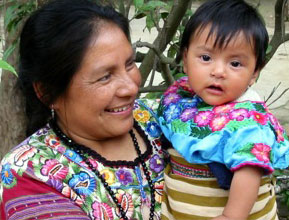Reproductive and Maternal Health in Guatemala
According to the World Health Organization:
The person best equipped to provide community-based, technologically appropriate and cost—effective care to women during their reproductive lives is the person with midwifery skills who lives in the community. Midwives understand women’s concerns and preoccupations. They accompany women through their reproductive lifespan, not only providing assistance at births, but during adolescence, pregnancy and delivery and postpartum. Yet, instead of empowering and supporting traditional midwives by providing comprehensive and culturally appropriate training, essential equipment, and practical support, Guatemalan health officials seek to exclude midwives from the formal health system in an attempt to centralize medical services within hospitals.

As a result, traditional midwives find their practices limited and their role in providing women’s health care threatened. Close to half of the maternal deaths in Guatemala occur in the hospital under medical management. Hemorrhage and infection are the two major causes of maternal death in both out-of-hospital and hospital settings. Midwifery training in Guatemala was largely focused on the identification of risk factors and transfer of patients into the hospital system.
This model ignores the reality that the majority of births are uncomplicated and can therefore safely take place outside the hospital setting. It also fails to address the cultural, logistical, and economic barriers that may interfere with transfers should a hospital birth become necessary. The prevailing approach was notably weak in regard to preventive care, early detection of complications, treatment of illness, and emergency first-aid. Additionally, most traditional midwives lack basic equipment, such as gloves and fetoscopes, needed to provide prenatal care. Supporting traditional midwives by providing basic equipment, demonstrating sterilization of instruments and teaching proactive techniques to control postpartum hemorrhage are strategies that can directly impact perinatal outcomes in Guatemala.
93% of Guatemala’s indigenous population are poor.
62% of Guatemalan women do not use a modern contraceptive method.
42% of the Guatemalan population does not have access to regular health care.
The majority of Guatemalan women give birth at home, with midwives attending 90% of all births in rural areas.
Midwives for Midwives addresses the following deficiencies.
When all women’s healthcare honors the innate intelligence of nature and is sustained through circles of collective wisdom, individuals WILL BE empowered and the world transformed.
- Maternal mortality in Guatemala was estimated between 88 and 153 deaths per 100,000 live births. Among indigenous Mayan women this figure is likely higher. After approximately 500 births in their Ixmucané Birth Center, MFM had a 7% hospital transfer rate.
- Infant mortality was approximately 40 per 1,000 live births. 100% of babies born at Ixmucané were seen 6 weeks postpartum in good health and all breastfeeding.
- 75% of Guatemala’s overall population lives in poverty; 93% of the indigenous population is poor. The majority of patients seen in Ixmucané were the indigenous poor and care was provided free of charge.
- 62% of Guatemalan women do not use a modern contraceptive method. At the 6 week postpartum visit, all women received a contraceptive method.
- Rates of sexually transmitted infections and reproductive tract infections among Guatemalan women are high and are on the rise. MFM performed free STD screening and counseling on every client at the birth center.
- Women, even those in urban areas of Guatemala, generally must visit many different health agencies to obtain well woman care, contraception, STI/HIV prevention education, maternity care, and post-natal care, if this range of services is available at all. Ixmucané Women’s Health Center provided all of these health services, one stop shopping.
- The majority of Guatemalan women give birth at home, with midwives attending 60-75% of all births (90% in rural areas). Ixmucané had an open door policy for all traditional midwives.

“Prescribe a midwife and save the lives of pregnant women and their babies”
– Professor Gamal I Serour, President of the International Federation of Gynecology and Obstetrics
The MFM Solution
- Honoring and respecting the work that traditional midwives already do;
- Expanding the traditional midwives’ knowledge and skills, and enhancing these with evidence-based aspects of modern midwifery theory and practice;
- Involving traditional midwives and their communities in the design and implementation of their training activities;
- Teaching tangible skills and providing one-on-one training to strengthen these skills;
- Providing a safe space for traditional midwives to share their experiences and concerns and to mobilize and advocate to improve their profession; and working towards a model that would allow traditional midwives to learn new skills in their own communities, helping them better meet the unique needs of their constituents.


